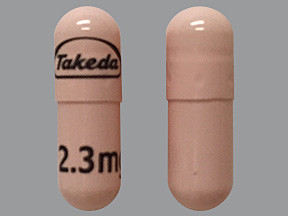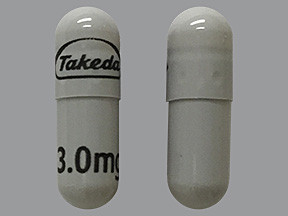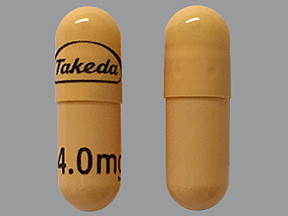IXAZOMIB - ORAL
PHONETIC PRONUNCIATION: (ix-AZ-oh-mib)
COMMON BRAND NAME(S): Ninlaro
GENERIC NAME(S): ixazomib citrate
Uses
USES: This medication is used with other medications (such as lenalidomide, dexamethasone) to treat a certain type of cancer (multiple myeloma). It is a chemotherapy drug that works by slowing or stopping the growth of cancer cells.
How to use IXAZOMIB - ORAL
HOW TO USE: Read the Patient Information Leaflet if available from your pharmacist before you start taking ixazomib and each time you get a refill. If you have any questions, ask your doctor or pharmacist. Take this medication by mouth at least 1 hour before or 2 hours after food as directed by your doctor, usually once a week for 3 weeks, then stopping the medication for 1 week. This is one cycle of treatment. Continue taking the medication this way as directed by your doctor. Swallow the medication whole with water. Do not crush, chew, or open the capsules. If you vomit after taking a dose, do not take another dose at that time. Take your next dose at the regular time. The dosage is based on your medical condition, lab tests, and response to treatment. Take this medication regularly to get the most benefit from it. To help you remember, take it at the same time and day of the week on the weeks you take the medication. Do not increase your dose or use this drug more often or for longer than prescribed. Your condition will not improve any faster, and your risk of side effects will increase. If a capsule breaks, avoid skin and eye contact with the contents of the capsule. If the contents of the capsule get on the skin, wash the area with plenty of water and soap. If the contents of the capsule get in the eyes, flush the eyes with plenty of water. Since this drug can be absorbed through the skin and may harm an unborn baby, women who are pregnant or who may become pregnant should not handle this medication.
Side Effects
Precautions
Interactions
Overdose
Images
Reviews
Faq for IXAZOMIB - ORAL
Ixazomib is an oral medication that belongs to a class of drugs known as proteasome inhibitors. It is used in the treatment of multiple myeloma, a type of cancer that affects plasma cells in the bone marrow.
Ixazomib works by inhibiting the activity of proteasomes, which are responsible for breaking down proteins in cells. By inhibiting proteasomes, Ixazomib helps to prevent the growth and spread of cancer cells in multiple myeloma.
Ixazomib is taken orally in the form of capsules. It is usually taken once a week, on the same day each week. It should be taken at least one hour before or at least two hours after eating.
Common side effects of Ixazomib may include nausea, vomiting, diarrhea, constipation, tiredness, rash, peripheral neuropathy (numbness or tingling in hands or feet), back pain, and decreased appetite. It is important to report any severe or persistent side effects to your doctor.
It is important to inform your doctor about any other medications you are taking, including over-the-counter drugs and herbal supplements, as they may interact with Ixazomib. Additionally, it is advisable to use effective contraception during treatment with Ixazomib, as it may cause harm to an unborn baby.
The response to Ixazomib treatment can vary from person to person. In some cases, improvement may be seen within a few weeks, while in others it may take several months. It is important to follow your doctor's instructions and continue taking Ixazomib for the prescribed duration.
Ixazomib should be taken at least one hour before or at least two hours after eating. This is to ensure optimal absorption of the medication.
If you miss a dose of Ixazomib, take it as soon as you remember on the same day. If it is already the next day, skip the missed dose and resume your regular dosing schedule. Do not take a double dose to make up for a missed dose.
Ixazomib is often used in combination with other medications, such as dexamethasone and lenalidomide, for the treatment of multiple myeloma. The specific combination therapy may vary depending on individual patient factors, and it is important to consult with your doctor to determine the most appropriate treatment plan.
Disclaimer
IMPORTANT: HOW TO USE THIS INFORMATION: This is a summary and does NOT have all possible information about this product. This information does not assure that this product is safe, effective, or appropriate for you. This information is not individual medical advice and does not substitute for the advice of your health care professional. Always ask your health care professional for complete information about this product and your specific health needs.



No Reviews Yet